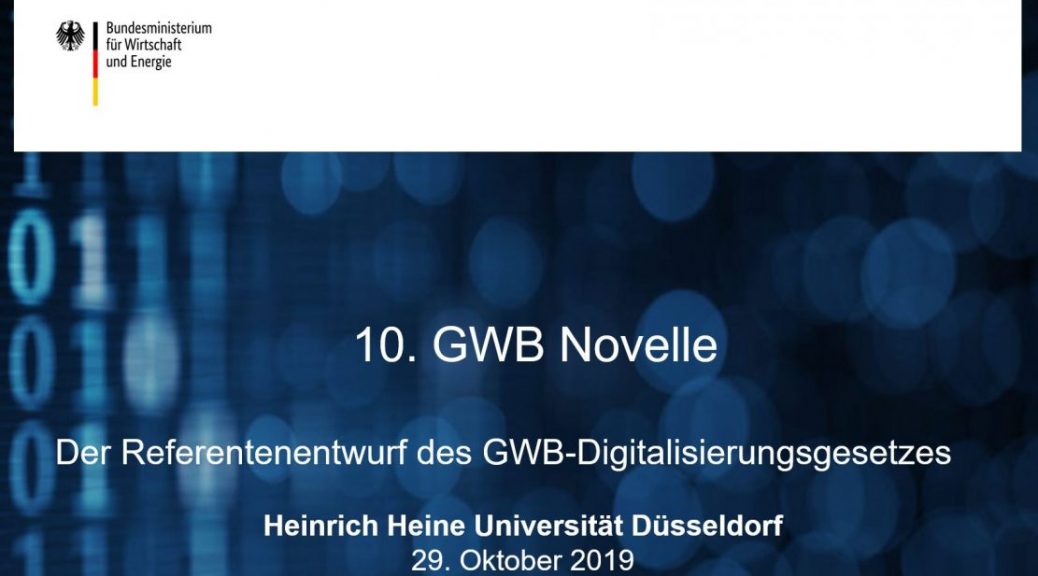
Conference Debriefing (15): Forum on the 10th amendment of the German competition act
The tour has kicked off: In Düsseldorf, the Federal Ministry of Economic Affairs and Energy (“MEAE”) appeared in persona of three senior representatives to introduce and discuss the draft bill on the 10th reform of the Act against Restraints of Competition (Gesetz gegen Wettbewerbsbeschränkungen or “GWB”). Anna-Jacqueline Limprecht and Hans-Markus Wagener report on how the first major test around Düsseldorf’s competition law scene went. Here is their Conference Debriefing!
Event Name: Forum on the 10th Amendment of the GWB
Venue & Time: Heinrich Heine University Düsseldorf, 29 October 2019
Host: Institute for Competition Law (IKartR) | Institute for Corporate Law (IUR)
Participants: First and foremost, the headliners, namely three of the main authors of the draft bill from the MEAE:
- Dr. Thorsten Käseberg (Head of the Department of Competition and Consumer Policy, Fundamental Issues of Competition Policy)
- Dr. Maja Murza (team member ibid.)
- Dr. Tobias Brenner (Federal Cartel Office, formerly seconded to the MEAE from there)
As audience/discussants, there gathered around 130 antitrust law experts from different backgrounds, i.e. judges and lawyers as well as academics.
Hold on a second, there is a draft bill?!
You bet! After the original event date at the beginning of September had to be postponed due to ongoing fine-tuning, D’Kart published the draft on 14 October. The representatives of the MEAE confirmed in advance that the D’Kart version still is the current state of work. Even though the official publication of the draft bill is still pending, it is currently scheduled to take place sometime next week. The ongoing delay results, among other things, out of the necessity to coordinate with other ministries, in particular with the Federal Ministry of Justice and Consumer Protection, which is currently working on major changes in corporate sanctions law. In any case, the box behind the adoption of the #GWB10 draft bill by the Federal Cabinet should still be checked this year in order for the bill to enter the parliamentary process as soon as possible in 2020.
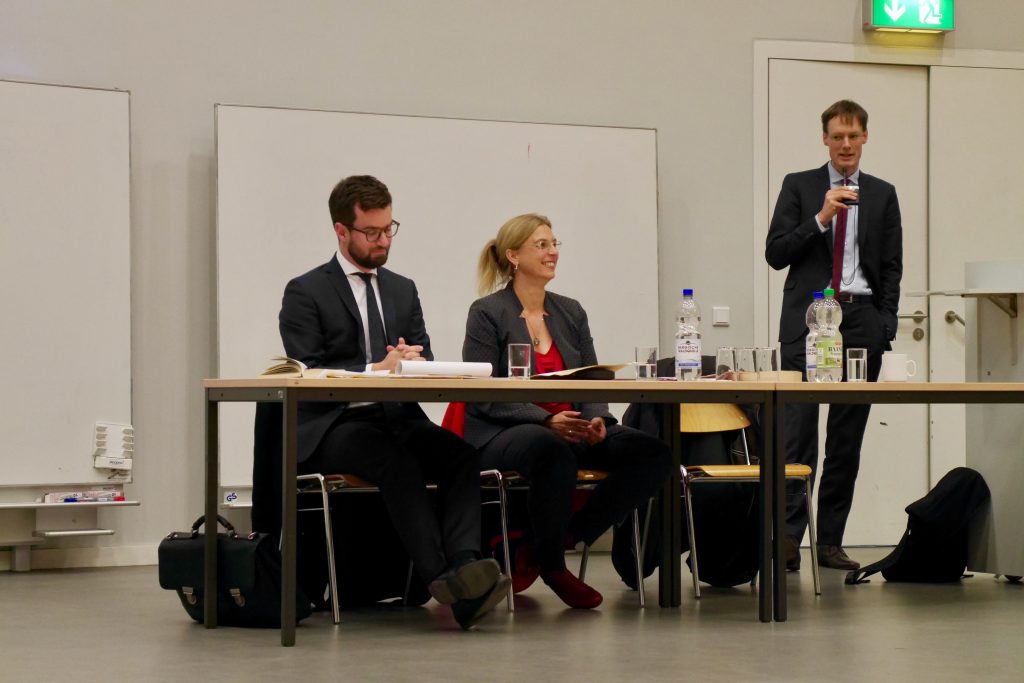
So, people in the Ministry come together and just write down whatever they think of for such a draft bill?
Haha, far from it (maybe in their dreams, but
more on that at the end…)! Thorsten Käseberg, the leader of the evening’s three
main actors trio reminded the audience at their “tour kick-off” of the
working principles from which the draft bill was to be developed. The central
political objectives of the project are laid out in the government parties’ “coalition
agreement”.
In concrete terms, this political agreement provides for (i) innovation with regard to the competition law challenges of digitization with a special focus on the taming of certain platform companies (i.e. Google, Amazon and Co.), as well as (ii) the acceleration of “competition law proceedings” in general (the coalition agreement does not provide for a distinction between administrative and court proceedings). With regard to EU law, #GWB10 also required the implementation of the requirements laid down by the ECN-Plus Directive (Directive 2019/1) for the Member States’ national law. The Directive’s objective is to strengthen the national competition authorities in order to enable them to enforce EU competition law to the fullest degree.
How will the power of the big players be tamed in the future?
This is exactly the core question to which #GWB10 is supposed to provide final comprehensive answers in the context of market abuse provisions. The #GWB10 authors were given suitable input, in particular in the form of the report by Heike Schweitzer, Justus Haucap, Wolfgang Kerber and Robert Welker (Modernising the Law on Abuse of Market Power) and by the Competition Commission 4.0. Even though the latter had a special mandate focusing on the EU level, the MEAE representatives stressed that the problems that have to be solved in the area of abuse are ultimately the same at the European as well as at the national level. The results of these reports have thus in part been incorporated into the draft bill (e.g. the planned §§ 18 (3b), 20 (1) 2 GWB on the specific concept of “intermediation power”).
The character of the planned changes ranges
from declaratory to revolutionary. Purely declaratory purpose can be attributed
to the explicit inclusion of access to data as a criterion for the assessment
of an undertaking’s market position. That is to clarify that the central
importance of data should also be considered in the environment of non-digital
markets. Ultimately, this is based on the ideas behind the well-established
essential facilities doctrine, which must correspondingly be applied to non-physical
infrastructures. § 19 (2) No. 4 GWB is thus supplemented by including the
refusal of access to data and networks to the list of abusive practices. In
addition, it shall be possible to tackle prevent the so-called tipping
of entire markets. To this end, § 20 (3a) GWB introduces a new
form of abusive behaviour, which will specifically refer to the prevention of
positive network effects on multilateral markets as defined in § 18 (3a) GWB.
Smells like revolution! Is there even more to come?
One more thing. The most significant revolution might be the introduction of the new § 19a GWB, which addresses “undertakings with paramount significance for competition across markets ” (“UPSCAM”). These are to be strictly distinguished from market-dominant companies. Doctrinally, it remained unclear (at least for now) whether UPSCAM in relation to dominant companies represented an aliud – as suggested by Petra Pohlmann – or if the term rather refers to some kind of “market dominance plus X”. Nevertheless, it became clear that the circle of potential addressees of the provision is very exquisite and thus extremely narrow according to the ideas of the authors. Thus, it could be carefully elaborated that a UPSCAM has to be thought of as a player of systematic relevance in the market.
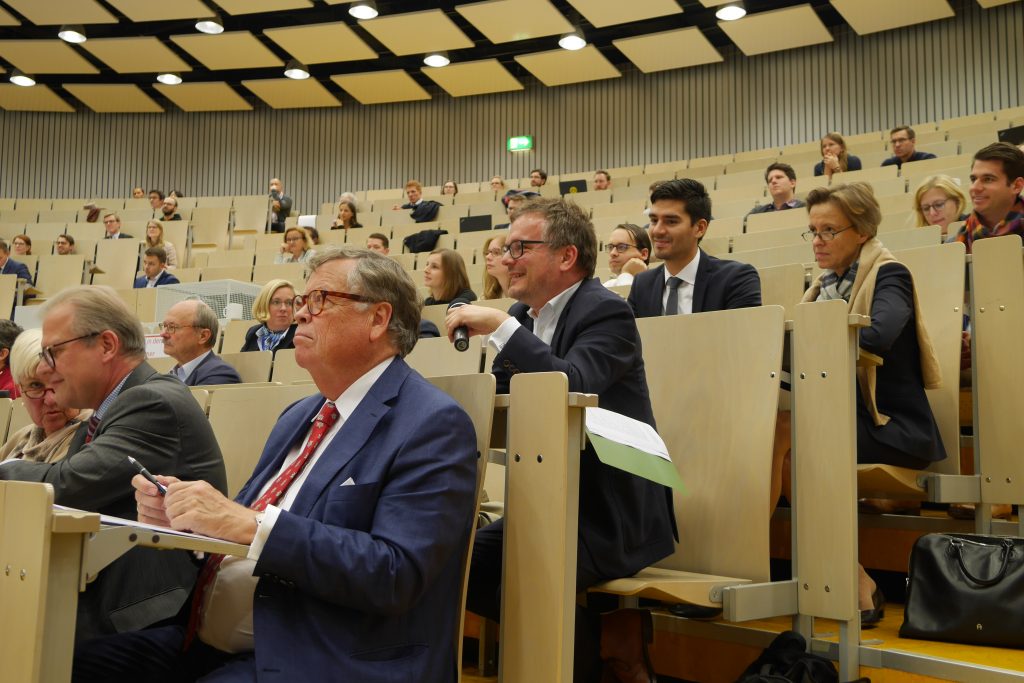
§ 19a GWB essentially authorizes the Federal Cartel Office (“FCO”) to intervene against certain, explicitly delicate and therefore specified behaviors of an UPSCAM. On the basis of a two-stage system laid down in the #GWB10 draft bill, the FCO can first determine in accordance with para. 1 that an undertaking is an UPSCAM in order to then – based on para. 2 – prohibit adopting abusive practices that harm competition. The specific practices that can be subjected to this procedure are incorporated in an exhaustive catalogue of infringements in § 19a (2) GWB (including e.g. self-preferencing through the use of intermediation power as well as “leveraging”). Maja Murza stressed that it would in practice be necessary for the FCO to put a time limit on the duration of the injunction in light of the general rule of law.
As currently envisioned, the prohibition order is only permissible if the specific conduct is not objectively justified. However, once the injunction has been issued, the burden of proof for an alleged justification lies with the affected UPSCAM.
Hans Jürgen Meyer-Lindemann said that especially with regard to § 19a this is no longer a “small revolution” (as had purportedly been said by a high-ranking member of the Bundeskartellamt), but a real one.
That’s quite something! The audience must have found themselves speechless?
Not at all! It would certainly have taken more than one evening just to satisfy the thirst for discourse on the matters of market abuse. There was some concern expressed by the audience that the identification of the addressee and the prohibition order could coincide with each other. Consequently, an undertaking could only have clarity about its status as UPSCAM or addressee of § 19a GWB as soon as it got mail from Bonn concerning a prohibition decision.
Thorsten Käseberg, however, emphasized that the path they had chosen in designing § 19a was one closely mirroring classic antitrust law concepts. In that, § 19a GWB would essentially spell out the results of the report offered by the special advisors appointed by Margrethe Vestager for the German legal environment. Nevertheless, together with Maja Murza, he predicted that in the near future we would see other legislative approaches not only in the Member States but also at EU level which will be much less based on classic legal concepts.
Can I join in? I mean – will there be private enforcement?
Several voices in the audience read the current wording as open towards private enforcement. Thus, at least once a prohibition order was issued, this could be enough ground for a cease and desist claim pursuant to § 33 (1) GWB. Tobias Brenner replied that private enforcement under § 19a GWB was at least not intended to have an initiative function. Thus, § 33 GWB – if at all – could by concept only be considered in a case in which the FCO had already issued a prohibition order. Vice versa he saw no room for § 33 GWB when the UPSCAM status has not (yet) been formally established by the FCO.
The new concept also received some praise, by Michael Baron and Wolfgang Kerber for instance, who both saw a careful approach that offered promising solutions to the burning issues of the present time.
And what about the implementation of ECN+?
Even though everyone is officially talking about the
“GWB-digitization law”, the ECN+ directive actually is the origin of the amendment. The Member
States fortunately still have time until 4 February 2021 to transpose the
directive into national law. In order to empower the competition authorities of
the Member States, the parties involved could hardly deviate from the
requirements from Brussels – full harmonization.
According to the principle that “parents are liable for their children“, the amendment refers to the undertaking as an economic unit. In addition to the competition authorities’ new authority to carry out questionings in the course of dawn raids, Maja Murza explained that Article 8 of the Directive is more or less directly addressed to Germany. Through the Directive, there is now a new “investigation tool” which has been missing in the toolbox of the German competition authorities. This refers to the power of the cartel authorities to require undertakings and associations of undertakings to provide all necessary information, which is now regulated in § 59 and § 81 m for administrative and fining proceedings.
This means that the competition authorities can now dig into their toolbox and obtain information in detailed Q&A sessions. Is there not such a thing as nemo tenetur?
Natural persons shall be protected from self-incrimination. For this purpose, on the one hand, a prohibition of the use of evidence will be introduced. On the other hand, the antitrust authorities can promise not to prosecute.
Well then, everything should be clear and everyone should be fully protected.
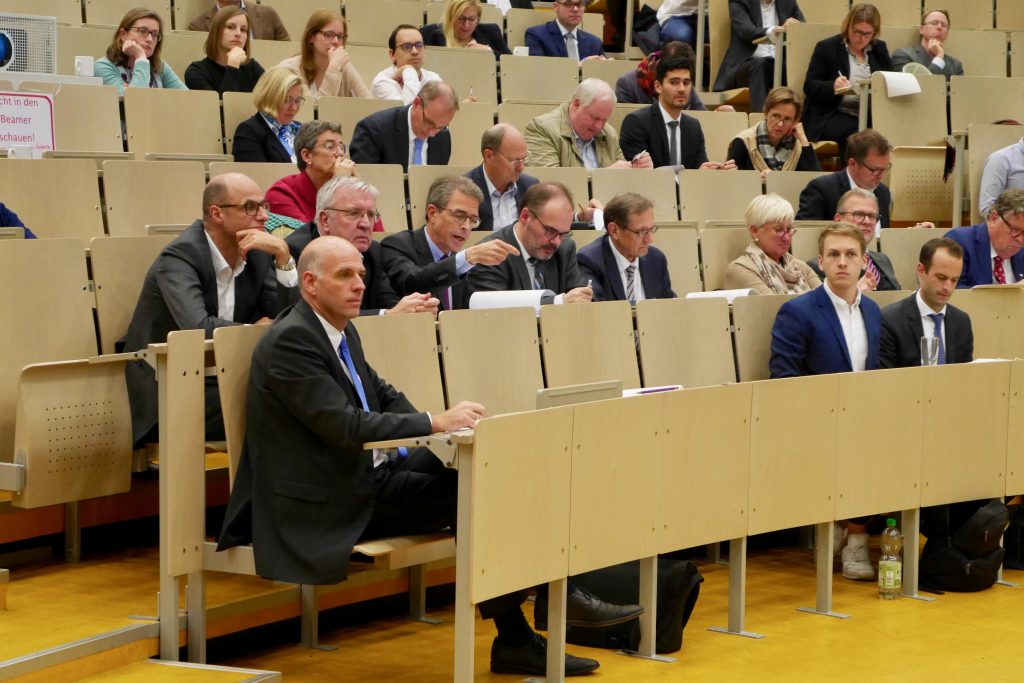
Well, some guests were of a completely different opinion. Hans Jürgen Meyer-Lindemann, for example, was convinced that nemo tenetur was not given adequate attention and that the coexistence of individuals (Betroffene) and companies (Nebenbetroffene) was not taken into consideration. The new regulations protect individuals, but not at all the companies behind them. They would have to expect that employees would be given protection by a promise not to prosecute them and that these employees would then testify against the company, thereby undermining its protection by the standards from Orkem. This workaround, so the argument, is unconstitutional. Maja Murza largely rejected this claim with reference to the extensive legal review of the rules that had taken place. Nevertheless, the speakers pointed out that the draft is still “work in progress“.
The role of the Federal Cartel Office before national courts was also discussed?
The case law in VEBIC is to be codified and thus an active part in the appeal procedure for
the competition authorities is to be ensured (see Article 30 of the Directive).
The exclusive competence of the public prosecutor existing to date is therefore
no longer in conformity with the Directive. The draft now introduces dual
competence. Everyone can imagine the consequences of this in practice. In this
respect, there is (secretly) hope for concerted practices between the undertakings
authorities. It may not seem entirely unrealistic that the public prosecutor’s
office will in due course make use of its discretion according to §75 of the
Act on Regulatory Offences and withdraw from the proceedings.
Now to the really important issues. Everybody wants it, nobody has it and, even more, nobody wants to give it away: money!
Of course, the topic of the imposition of fines was not missing. Following the Grauzement I decision of the Federal Court of Justice (BGH), it is now to be codified that the so-called turnover achieved from the infringement must be considered for the setting of fines. However, the audience also noted that the Higher Regional Court (OLG) was not subsequently bound by the setting of fines by the competition authority. Therefore, the current trend to increase the amount of fines at Court would not be stopped.
The speakers agreed. However, #GWB10 authors had tried to satisfy all interests in the best possible way and, in particular, had taken into account the prohibition of mathematical specifications in order to preserve the independence of the judiciary.
It is not clear yet what #GWB10 will contain on the consideration of the behavior after the administrative offence (Nachtatverhalten). #GWB10 authors are just working on it. In any case, the speakers assured us that the authors had taken note of the topic of compliance and had made efforts in this regard.
A few words on merger control…
The second domestic turnover threshold will be raised from 5 to 10 million, the time frame for the second phase proceedings will be extended from 4 to 5 months and the ministerial approval will in future require that an application for an interim injunction has been rejected as unfounded or that the appeal was dismissed as unfounded by the Düsseldorf court.
On consumer protection, there are no new powers for the FCO in the amendment.
Very clear announcement of the speakers: “People did
not want to take that step now.” The FCO’s failure decision on Facebook
has so far not been able to change this view. Tobias Brenner predicts that in 5
years there will be certainly a different situation in law. True to the motto
“Who offers more?“, this
change could be due to the New Deal For
Consumers – it is already knocking on Maja Murza’s door.
Are there any goodies in the amendment?
First of all, more legal certainty should be created for cooperation agreements. Among other things, undertakings and associations will in future have the right to obtain a decision within a period of 6 months that there is no reason for the cartel authority to take action. The Regulation 1/2003 served as reference to limit this period. So, according to the speakers’ own statements, they had really thought about European law.
After that Broadcom interim measure by the Commission, such stuff is now standard, right?
The requirements for an intervention in #GWB10 for potentially
harming effects and the evidence are moderately lowered. However, a new aspect
is that the imminent threat of serious harm to another undertaking is taken into
consideration in this context. To avoid that this regulation has a severe
impact on the undertakings, sentence 2 of the new § 32a provides for an
exception. To this end, the undertaking has to present facts according to which
the order would result in an unacceptable hardship not required by overriding
public interest. The aim is a better operability, especially in digital cases.
These changes have been copied were taken from other national
regulations (e.g. France, UK).
When it comes to private damage claims, we are literally guessing what will happen now…
… exactly: the presumption that customers are affected by the cartel. Even if this presumption was not obvious at first, it seems to be important enough to be mentioned in the amendment. A rebuttable presumption is introduced for direct and indirect customers.
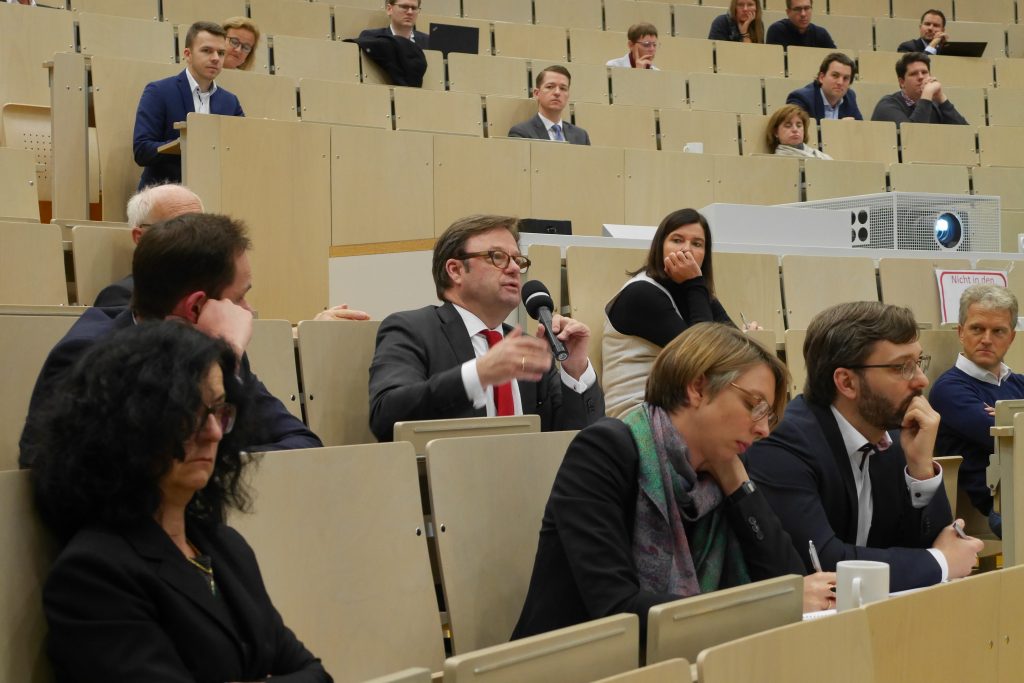
With a view to decisions by the OLG Düsseldorf, a clarification regarding the urgency requirement was also necessary. Therefore, no urgency needs to be shown in order to demand the handing over of a decision. This was probably “not a doctrinally clean regulation, but a practically operable solution“.
Why not just insert a presumption of damage?
Tobias Brenner replied spontaneously that people with proposals regarding the level of damages may step forward…
Our dear plaintiffs readers should feel the call
at this point to mail a few more suggestions to the ministry…
And the next tour dates?
The official release of the draft is hoped to take place next week. But it’s not all over yet. On the question when exactly a decision by the government is to be expected, the speakers directed our attention to their right of refusal to comment in order to protect themselves. However, it was announced that the parliamentary procedure for #GWB10 will (probably) be completed in the first half of 2020.
Do say: “We try to make everything possible…”
Don’t say: “…but we work in a political context.”
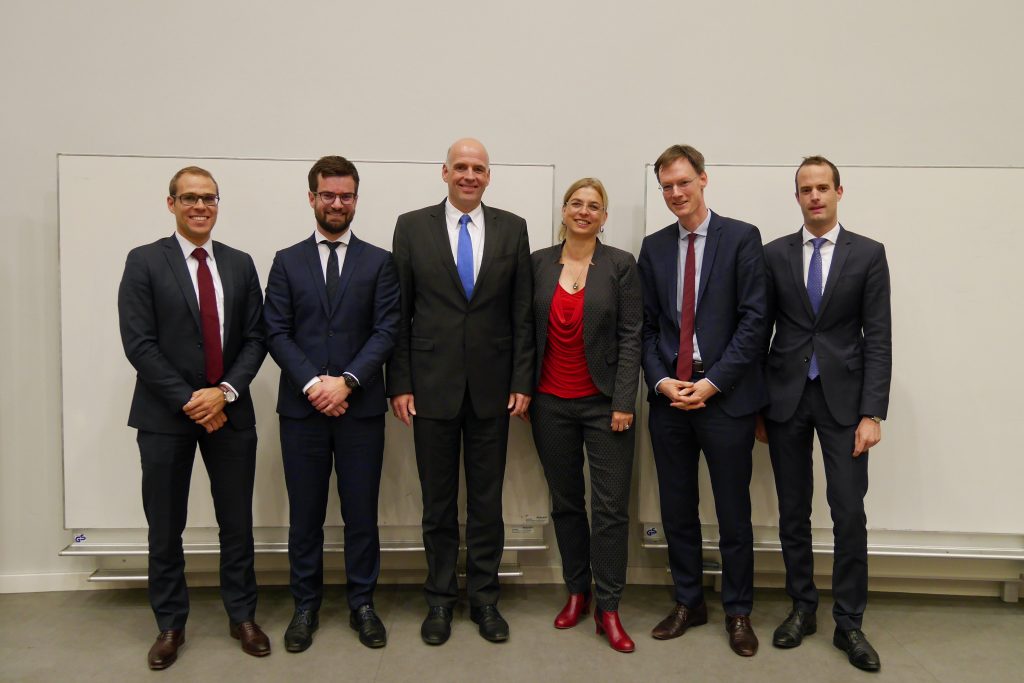
Anna-Jacqueline Limprecht and Hans-Markus Wagener are researches and doctoral candidates at the chair of Prof. Dr. Christian Kersting at Heinrich Heine University Düsseldorf. Photos by Sarah Langenstein.
5 thoughts on “Conference Debriefing (15): Forum on the 10th amendment of the German competition act”
Ein sehr gelungener Beitrag! Danke!
Vielen Dank für diese informative und gleichzeitig humorvolle Vorausschau auf den neuen Referentenentwurf. Ein sehr interessantes Debriefing!
Sie schreiben von einer “Tournee”. Tritt das Trio nochmals in einer anderen Stadt auf?
Bei den vergangenen Novellen war es so, dass Vertreter/innen des Ministeriums auf vielen Podien die Grundzüge der Novelle vorgestellt und diskutiert haben. Ich gehe davon aus, dass es diesmal nicht anders ist. Das FIW hat beispielsweise für den 27.11.2019 in Berlin eine Veranstaltung angekündigt (siehe http://www.fiw-online.de/de/veranstaltungen/berliner-kolloquium). Die “Tourdaten” für diese Novelle kenne ich aber nicht – und an den Auftakt wird natürlich kein “Gig” herankommen…